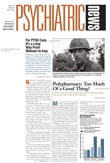More than 600,000 California voters have signed a petition in support of taxing the state’s millionaires to provide funds to expand mental health services.
The likely result is that the state’s November ballot will offer a chance to vote on a proposal to enact a tax surcharge of 1 percent on taxable personal income above $1 million.
State officials estimate that the new tax would generate $680 million in Fiscal 2005-06, the first year in which the program would be fully operational.
Funds, channeled through the state’s existing mental health system, would be directed to a wide range of services, including training and educational programs, but would be targeted primarily to those with severe mental illness or likely to develop it (Psychiatric News, January 2).
The California Psychiatric Association (CPA) is a member of the Campaign for Mental Health, which organized the effort to collect signatures.
Randall Hager, CPA’s government relations director, called the outcome a “great victory.” Signatures exceeded by about 70 percent the total necessary to get on the ballot.
Former CPA president Richard Shadoan, M.D., said he thought the petition drive was successful because the “huge social cost” of recent cuts in mental health services is so apparent.
“We have about 50,000 homeless people in California, and about one-third of them have mental illness. The criminal justice system is overwhelmed with people who need mental health services rather than jail terms.”
Shadoan and Maria Lymberis, M.D., co-chair the CPA’s task force for the ballot initiative. Lymberis is also chair of APA’s Investment Oversight Committee.
Success Already Evident
Shadoan believes the campaign has already brought about some benefits. “It has galvanized and brought together mental health advocates of many disciplines and backgrounds, including family members.”
Coalition members include NAMI-California, California Academy of Child and Adolescent Psychiatry, Mental Health Association in California, two major unions, and advocacy organizations for the elderly.
Shadoan pointed out that if passed, the ballot initiative would provide funds to train more psychiatrists and mental health professionals.
“We have a major shortage of psychiatrists, particularly those who treat children,” he added.
Shadoan is a clinical professor of psychiatry at the University of California, San Francisco.
The campaign adopted sophisticated polling and political methods to persuade California voters to support a new tax in a time of a severe budget crisis.
Last spring, Fairbank, Maslin, Maullin, and Associates, an opinion research firm, conducted polls and focus groups to determine support for the initiative and to identify messages and themes that would promote passage.
The firm advised the campaign, “The severely mentally ill evoke the most sympathy and compassion from voters. . . . The campaign should focus on children. . . . Voters want a proven model. . . . Voters do not wish to create a comprehensive social safety net with this initiative. . . .Voters are less likely to support a measure that covers more types of people and services.”
Financial Benefits Stressed
Campaign organizers emphasized positive financial and social outcomes from legislation (AB 34) passed in 1999 for pilot programs providing integrated services to people who are homeless and mentally ill or are at risk of homelessness or being incarcerated.
A recent conference on the programs “brought together hundreds of providers and consumers from throughout the state to collaborate regarding ‘what works,’ with the goal of continuing to make these programs even better,” according to the Web site www.campaignformentalhealth.org.
The President’s New Freedom Commission on Mental Health cited the California effort as a model program.
Shadoan acknowledged that the ballot-initiative route to achieving funding is “not good government.” But, he pointed out, the effort could be the only way to help alleviate a major funding crisis for the treatment of people with mental illness, given the difficulties of passing tax measures in the state legislature.
A positive outcome in November, he believes, could encourage more financial support for mental health services in other states. ▪
